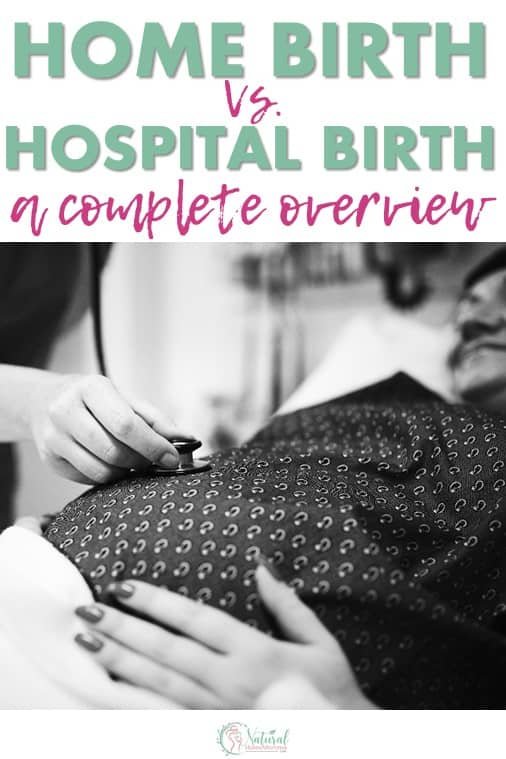
When you find out you are pregnant the excitement and emotions that flood you are intense. You’re going to be a mother! And soon after that, the reality of giving birth in just 9 short months starts to set in.
Then you start to wonder, where should you birth that sweet baby of yours? Home birth vs. hospital birth?
For many U.S. women, our minds immediately picture birth in a hospital because the overwhelming majority of births happen there. Hospital births are what we see in movies and largely on social media.
But don’t hurry into the decision of a hospital birth just because that’s what the majority does!
When you take a close look at home births vs. hospital births you’ll quickly learn that birthing at home is a safe, intimate, and fabulous choice for many mommas. Home births are associated with far fewer birth interventions, a more positive birth experience, and research shows they are just as safe as hospital births.
Below we’re going to look at a complete comparison of home birth vs. hospital birth. We’ll cover birth outcomes, safety, risks, home birth pros and cons, and even compare the cost of home birth vs. hospital birth. After this read you’ll be well prepared to decide is a home birth vs. a hospital birth could be right for you.
Where are women in the US giving birth?
When it comes to giving birth in the US, the overwhelming majority of mommas choose to birth in a hospital. In fact, just 1.6% of all births in the US in 2017 were out of hospital (that is birth centers or at home). That’s about 1 in 62 births.
However, this study looked at birth certificate data from 2004 to 2017, and found that the number of out of hospital births increased by 77% from 2004 to 2017! Clearly, mommas are taking a serious interest in planned home births with that kind of an upward trend.
And it’s not just the everyday mommas either, many celebrities have chosen to have home births and gone public about the experience. This brings positive and empowering media attention to a birthing practice that was the norm for generations.
How do birth outcomes compare in home births vs. hospital births?
You may be wondering, why this upward trend and interest in home births in recent years? When you take a look at the research and data of home births vs. hospital births, it becomes clear.
More and more mommas today are interested in having a “natural birth”. For many, this means birthing without an epidural, and for most, natural birth is a completely unmedicated birth.
While a natural birth can be achieved in a hospital setting, your likelihood of succeeding with an unmedicated birth is far higher in the comfort of your own home under the care of a home birth midwife.
Let’s take a look at birth outcomes at home vs. those in hospitals
- Significantly lower likelihood of induction in planned home birth (1.5% vs. 30%)
- Significantly lower likelihood of labor augmentation in planned home birth (1% vs. 26%)
- Significantly lower rates of C-section among planned home births (5% vs. 25%)
- Less use of episiotomy
- Less experience of significant tearing
- Less use of forceps,
- Less experience of issues with placental delivery
- Less experience of infection
- Less experience of preterm birth
- Less experience of low birth weight
When you consider those birth outcomes, it becomes clear why the momma seeking a natural birth, who is considered a safe and eligible candidate for a home birth, is choosing this route.
Let’s take a closer look at who can have a home birth and the risks involved below.
Are home births as safe as hospital births?
In short, for women that are considered low risk in their pregnancies, home birth is just as safe as a hospital birth. In general, if you want to have a planned home birth, your midwife will not allow it if you do not fit a certain list of criteria that make it a safe option.
In addition to being a good candidate for home birth, every momma with the intention of planning a home birth should do so from an educated standpoint. There are a few (slight) risks involved with home birth.
So what makes you a good candidate for home birth?
- You have no pre-existing medical conditions
- You do not have diabetes or gestational diabetes
- You do not have high blood pressure or preeclampsia
- You are pregnant with only one baby
- You do not go into labor before 37 weeks
- You do not go beyond 41 weeks of gestation
- Your baby is in the optimal position for birth
- You go into labor spontaneously
- You are interested in natural childbirth
- You haven’t experienced a past pregnancy with complications
- You are ready to take a leading role in your birth experience
- You are ready and willing to research, plan and coordinate your home birth supplies, birth team and understand the costs associated with home birth
If you meet these criteria, home birth is just as safe as a hospital birth. To have a planned home birth, you’ll need to choose an experienced midwife to attend your birth. She will play an active role in continuously determine your eligibility and the safety of you having a home birth.
If at any point during your pregnancy and routine prenatal care a red flag arises, you can trust that your midwife will advise you to change your plan to a hospital birth.
What are the risks associated with home birth?
There are a few perceived risks that are slightly higher in home births vs. hospital births. However, these risks are extremely low in both home and hospital settings.
- Slightly higher rates of blood transfusion/hemorrhage in home births (6 vs. 4 in 1000 births)
- Slightly higher rates of perinatal deaths (but still extremely low in both settings, some studies find no difference)
- Slightly higher rates of neonatal seizures (but still extremely low in both settings)
- In first-time mothers attempting planned home birth, approximately 30% will need to be transferred to the hospital. This is usually due to exceptionally long or stalled labors
Read more about reasons for a hospital transfer during home birth to understand perceived risks and various outcomes of planned home birth.
What are the pros and cons of home birth vs. hospital birth?
When it comes to a planned home birth vs. a hospital birth, each momma is going to have their own unique list of home birth pros and cons. Your comfort level with birth, mental health, partner support and desire for a natural birth are going to play a significant role in the pros and cons you perceive.
If you are thinking home birth could be a good option for you, learning as much as you can and creating a personal pro and con list is a great exercise. Here are some perceived pros and cons of home birth vs. hospital birth to get you started:
Pros of a home birth:
- Achieving a natural, unmedicated birth
- Greater sense of control over your birth experience and freedom during labor and birth
- Undivided attention and support from your midwife
- More say and freedom over who is present at your birth
- More personalized prenatal care, often in the comfort of your own home
- Birthing in a familiar and intimate environment
- No limitations on the type of delivery (land vs. water)
- Easier to opt out of unwanted medical procedures
- No logistics to plan for such as getting to the hospital during active labor
- Getting to spend the first hours and days with your newborn in your own home
Potential cons of a home birth:
- Your birth may not be covered by insurance
- Possibility of a hospital transfer especially if it is your first birth
- Possibility of a hospital birth if you go past your due date or your eligibility for home birth changes toward to end of your pregnancy. This may lead to a feeling of guilt or dissatisfaction with your birth experience
- Home birth is not an option for every momma
- Home birth is often not accepted by mainstream culture
- Necessary to monitor you and baby’s vitals closely in the first few days postpartum vs. the continuous care and monitoring available in a hospital
Don’t miss our more thorough discussion of home birth pros and cons to help you create your own pro and con list.
How much does a home birth vs. hospital birth cost?
In the US the vast majority of insurance companies do not cover the cost of home birth, though some are starting to. The first step towards figuring out the financial side of home birth vs. hospital birth is a direct call to your insurance company to understand your coverage. With so much variation between insurance companies and plans across the US it’s impossible to generalize what your cost will be.
Home birth generally costs between $2000-$4000 out of pocket, which includes all of your prenatal care, the birth, and postpartum care. For many families, this winds up being the same as, or even less expensive than, a hospital birth that is covered by insurance.
In the US the average cost of a vaginal delivery in a hospital after insurance has been applied is $2000. When you stack that up against the average cost of a home birth you’ll find yourself on a pretty even playing field when it comes to the cost of home birth vs. hospital birth.
Home birth vs. hospital Birth, which one is right for you?
With this complete overview of home birth vs. hospital birth, you can make a more informed choice when it comes to deciding the perfect place for your birth.
But don’t stop getting educated about home birth here! We’ve got a ton of great info about home birth in our Home Birth Section that we don’t want you to miss.
We’d love for you to share your birth story, whether it was a hospital birth or home birth, below to help continue the discussion of home birth vs. hospital birth.


